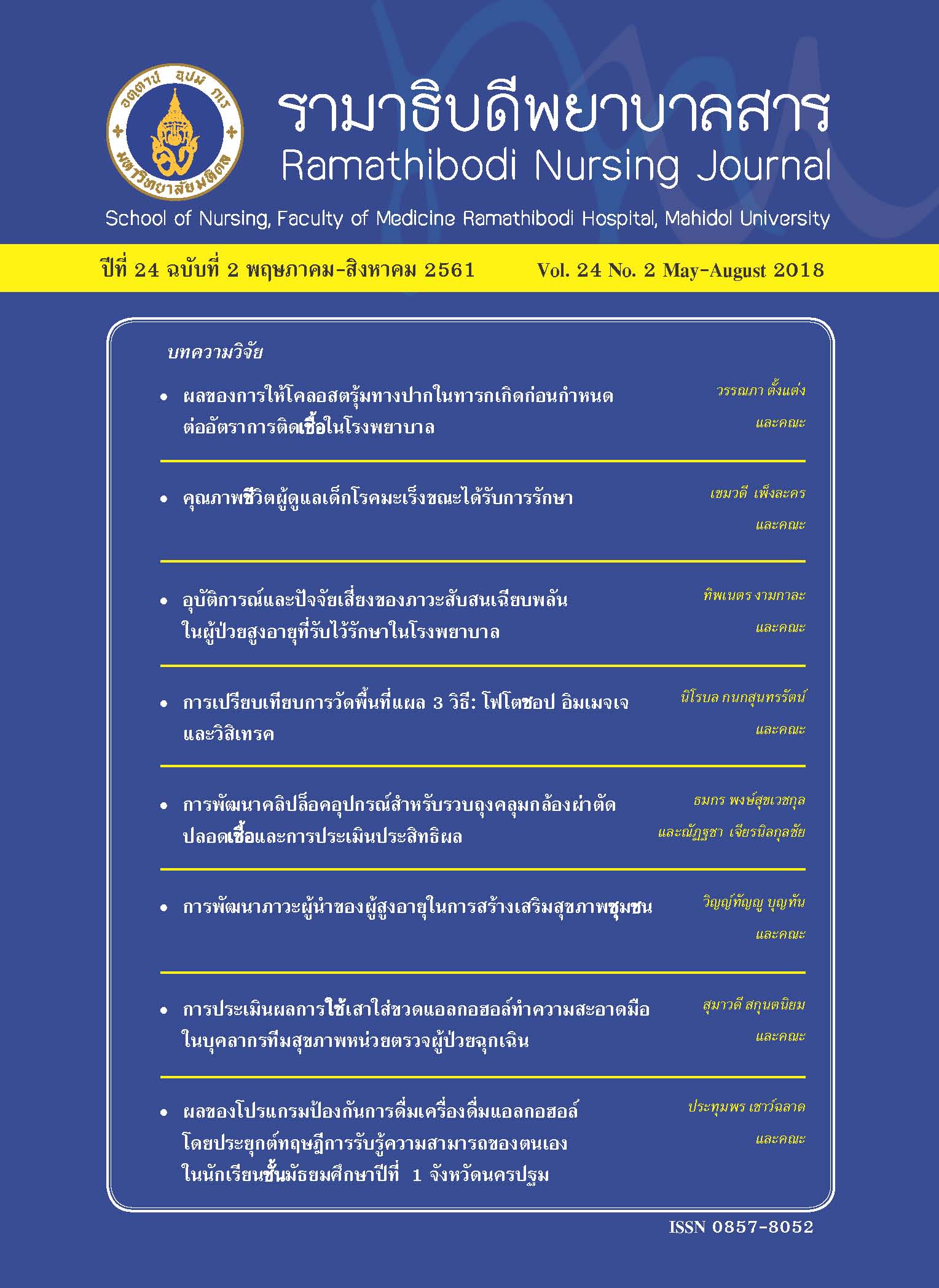Leadership Development of Older Persons in Community Health Promotion
Main Article Content
Abstract
การศึกษานี้เป็นการวิจัยเชิงชาติพันธ์วรรณาแบบวิพากษ์ มีวัตถุประสงค์เพื่อศึกษาการพัฒนาภาวะผู้นำผู้สูงอายุในการสร้างเสริมสุขภาพชุมชน ผู้ให้ข้อมูลเป็นผู้สูงอายุที่มีภาวะผู้นำ จำนวน 89 คน และผู้ที่เกี่ยวข้อง จำนวน 37 คน วิเคราะห์ข้อมูลจากการสังเกต การสัมภาษณ์ และสนทนากลุ่ม ด้วยวิธีการจัดระเบียบเนื้อหาของข้อมูล การวิเคราะห์จำแนกประเภทข้อมูล การวิเคราะห์เชิงเนื้อหา การวิเคราะห์ตามช่วงเวลา และการวิเคราะห์แบบเมทริกซ์ ผลการวิจัยสะท้อนถึงลักษณะภาวะผู้นำผู้สูงอายุ 7 คุณลักษณะ ได้แก่ มีความกล้า เป็นผู้รู้ ใจกว้าง รักการพัฒนา มีคุณธรรม ไม่เห็นแก่ตัว และทำงานเป็นทีม มีกระบวนการในการพัฒนาภาวะผู้นำ 2 กระบวนการ คือ 1) ผู้สูงอายุพัฒนาด้วยตัวเอง โดยใช้หลักธรรมทางพระพุทธศาสนา คือ พรหมวิหาร 4 ฆราวาสธรรม 4 ศีล 5 และคำสอนของรัชกาลที่ 9 ในการทำความดีเพื่อส่วนรวม และปรัชญาเศรษฐกิจพอเพียง เป็นแนวทางในการดำเนินชีวิตจนพัฒนาเป็นภาวะผู้นำ 2) ผู้อื่นช่วยพัฒนา เป็นการได้รับการสั่งสอนจากบรรพบุรุษ และมีการสร้างพื้นที่ให้ผู้สูงอายุได้มีกิจกรรมร่วมกันได้แสดงออกถึงภาวะผู้นำ ได้แก่ ชมรมผู้สูงอายุ และโรงเรียนผู้สูงอายุ ภาวะผู้นำของผู้สูงอายุก่อให้เกิดกิจกรรมสร้างเสริมสุขภาพชุมชน ทั้งที่ผู้สูงอายุสร้างขึ้นเพื่อตนเองและเพื่อผู้อื่นด้วย 3 วิธีการ ได้แก่ 1) วัจนภาษา ชักชวน แนะนำ สั่งสอน ให้คำปรึกษา และถ่ายทอด 2) อวัจนภาษา ที่ผู้สูงอายุทำตัวเป็นแบบอย่างแก่ผู้อื่น และ 3) การสร้างระบบการทำงาน ให้ง่ายต่อการทำงาน ก่อเกิดผลลัพธ์ขึ้นกับตัวของผู้สูงอายุ ครอบครัว และสมาชิกชุมชน ครอบคลุมด้านสุขภาพ สังคม เศรษฐกิจ สิ่งแวดล้อม และการเมืองการปกครอง โดยมีปัจจัยเงื่อนไขในการขับเคลื่อน 3 ปัจจัย ได้แก่ ชมรมผู้สูงอายุ โรงเรียนผู้สูงอายุ และสภาวัฒนธรรมตำบล ที่สร้างโอกาสให้ผู้สูงอายุได้ร่วมบริหารจัดการกิจกรรมต่าง ๆ ที่ส่งผลต่อการพัฒนาภาวะผู้นำและก่อให้เกิดการสร้างเสริมสุขภาพชุมชน องค์ความรู้จากการศึกษานี้ให้ข้อมูลที่แสดงถึงศักยภาพของผู้สูงอายุที่สามารถพัฒนาภาวะผู้นำให้เกิดขึ้นและใช้ภาวะผู้นำของตนเองในการเป็นแกนนำสร้างกิจกรรมต่าง ๆ เสมือนหลักฐานเชิงประจักษ์ในการสร้างวาทกรรมใหม่จากการมองผู้สูงอายุเป็น “ภาระ” ไปสู่ผู้ที่มี “พลัง” ในการสร้างสรรค์สังคม
Article Details
บทความ ข้อมูล เนื้อหา รูปภาพ ฯลฯ ที่ได้รับการตีพิมพ์ในรามาธิบดีพยาบาลสาร ถือเป็นลิขสิทธิ์ของวารสาร หากบุคคลหรือหน่วยงานใดต้องการนำทั้งหมดหรือส่วนหนึ่งส่วนใดไปเผยแพร่หรือเพื่อกระทำการใด ใด จะต้องได้รับอนุญาตเป็นลายลักษณ์อักษรจากรามาธิบดีพยาบาลสารก่อนเท่านั้น
References
TGRDI; 2015. (in Thai)
2. Miller CA. Nursing for wellness in older adults. 6th ed. Philadelphia: Wolters Kluwer/Lippincott Williams &
Wilkins; 2015.
3. National Board of the Elderly, Ministry of Social Development and Human Security. The National Elderly
Plan No.2 (2002-2021), 1st revised edition. Bangkok:Teppenwanich; 2010. (in Thai)
4. Chaidachatorn S, Thipsungnoen T, Kaewprom K. Mental health status among the elder persons in Nakhon
Ratchasima Province. The Journal of Boromarajonani College of Nursing, Nakhonratchasima. 2017;21(1):31-
40. (in Thai)
5. Yodpet S, Sombat L, Salabol N, Sakdaporn T. Operation and activities of elderly clubs. Bangkok: J Print 2 ; 2555.
(in Thai)
6. Viwatpanich K. Situation and direction of research-thesis in elder club in Thailand. Thammasart Medical Journal.
2555;12(2):331-7. (in Thai)
7. Udplong A, Rojkureesateian K, Vong-Ek P. Factors driving the elderly club’s activities: a case study of Ban
Mae La Mao elderly club, Pha Worsubdistrict, Mae Sot district, Tak province. Journal of Public Health.
2013;43(1):68-79. (in Thai)
8. Nuntaboot K. Community health system the collaborative process of 3 major systems in the community. Nonthaburi:
The Graphic Go Systems; 2010. (in Thai)
9. World Health Organization. Milestones in Health promotion statements from global conferences; 2009
[cited 2016 Dec 1]. Available from: http://www.who.int/ healthpromotion/Milestones_Health_Promotion_
05022010.pdf
10. Maneerat P,Tuntirathanawong K, Pechmanee S. The efficacy of elderly leaders on health promotion among
ageing: a case study of Tairomboon elderly’s society, Bansong sub-district,Weangsra district, Suratthani
province. Journal of Graduate School, Pitchayatat. 2015;10(1):55-66. (in Thai)
11. Morse JM. Qualitative health research creative a new discipline. California: Left Coast; 2012.
12. Nuntaboot K. Development of network cooperative center and older care learining management. Khon Kaen:
Community Health System Research and Development Center, Faculty of Nursing, Khon Kaen University; 2017.
(in Thai)
13. Schreier M. Qualitative content analysis in practice. London: Sage; 2012.
14. Polit DF, Beck CT. Nursing research: principles and methods. 7th ed. Philadelphia: Lippincott & Wilkins; 2004.
15. Guba EG, Lincoln YS. Naturalistic inquiry. Newbury Park,CA.: SAGE; 1985.
16. Department of Older Persons. Knowledge about self-care and potential development of older persons inventory as
occupation and work aspect. Bangkok: The Agriculture Co-operative Federation of Thailand Press; 2013.
(in Thai)
17. Northouse PG. Leadership: theory and practice. 6th ed. Thousand Oaks, CA: SAGE; 2013.
18. Gopee N, Galloway J. Leadership & management in healthcare. 2nd ed. Los Angeles, CA: SAGE; 2014.
19. Porter-O’Grady T, Malloch K. Quantum leadership:building better partnerships for sustainable health. 4th ed.
Sudbury, MA: Jones & Bartlett Learning; 2015.
20. Banloa Sub-district Minicipal. Elderly care system learning program. Prayao: Health and Environment
Division, Banloa Sub-district Minicipal. (in Thai)
21. Benjaponpitak A. Languange communication and apply in daily life. Nontaburi: Sukhothai Thammathirat Open
University Press; 2016. (in Thai)
22. Torugsa S. Application of management principles for developing work continuous and sustainable. 3rd ed.
Bangkok: Health Administration Department, Faculty of Public Health, Mahidol University; 2016. (in Thai)
23. Miller CA. Nursing for wellness in older adults. 6thed.Philadelphia: Wolters Kluwer/Lippincott Williams &
Wilkins; 2015.
24. Taweesit S, BoonyamanondS. Value of the elderly from the eyes of Thai society. Bangkok: Duan Tula Press; 2010.
(in Thai)


